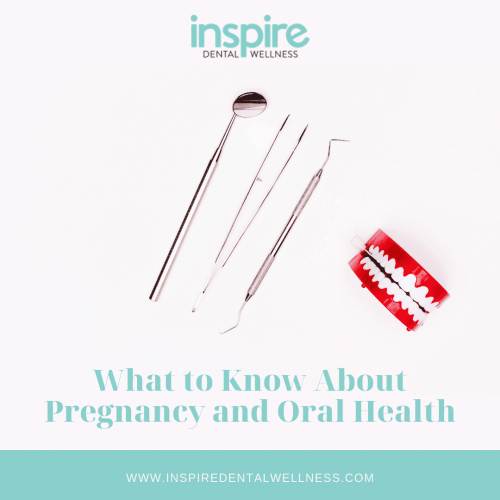
Pregnancy can be such a wonderful experience, but that doesn’t mean it isn’t also a time of discomfort. You often feel tired, especially in the first trimester and late into the third trimester. Your moods can change quickly and suddenly. In addition to these emotional and mental changes, pregnancy brings about many physical changes, too… and we’re not just talking about your belly! Your back can start to ache, your hair might look (and feel) different, and your feet will probably swell.
It should come as no real surprise that you would experience changes inside your mouth as well throughout your pregnancy. All of the changes happening to your body and the adjustments to your diet and lifestyle can lead to potential issues for your teeth and gums. Late night snacking, morning sickness, dry mouth, and hormones can all contribute to oral health concerns.
Facts and Myths
Have you ever heard the old wives tale that says women can expect to lose one tooth for every baby? It’s totally false (thank goodness) but it comes from a concern about calcium. People used to think that if there was a calcium deficiency, the teeth would provide what’s needed for the growing fetus. Now we know that it’s the mother’s bones that suffer if calcium intake is too low. It’s still not great news, but at least you won’t lose your teeth. Make sure you’re taking a good prenatal vitamin and getting plenty of calcium in your diet and you’ll be just fine.
Even though you don’t have to worry about losing teeth, there are a few things to look out for. Beginning at around 4-6 weeks and continuing through the end of your pregnancy, you may notice:
- Bleeding of the gums
- An increase in cavities
- Granulomas (skin growths that are small, round, and usually bright red in color)
These are all totally normal, and your dentist can help you determine whether you need to make any changes to your oral health routine.
Increased Risk for Gum Disease
Did you know that the increase in hormones during pregnancy can actually lead to an increased risk for gum sensitivity and gum disease? Individuals who are pregnant can see an increase in plaque for a number of reasons, which can lead to gum disease.
It’s so important to keep a stringent oral care routine to try to keep gum disease at bay. Not only can it lead to more cavities for mom, it has also been shown to impact the developing fetus. Studies are still being done to prove a definitive link, but some have already shown a link between periodontal disease and underweight preterm babies.
The Dreaded Morning Sickness
Not every pregnancy will include vomiting but many will. Of course, it’s no fun to be sick, but it’s also not good for your teeth. Stomach acid is acidic (unsurprisingly) and can erode tooth enamel, leaving them more vulnerable to decay.
If you’re dealing with this, you can protect your teeth and gums by rinsing often with ¼ teaspoon of baking soda dissolved into one cup of water. It’s important to remember NOT to brush your teeth right after vomiting. This can actually make it even easier for stomach acid to penetrate your tooth enamel. Rinse out your mouth instead, then brush after about 30-60 minutes have passed.
Routine Checkups During Pregnancy
It is so important to keep your regular check-ups during your pregnancy. Despite what people think, there’s nothing to be nervous about. We can even do x-rays safely these days. Ideally, we would like for you to wait until your second trimester, especially if visiting the dentist induces stress. Just be sure to let us know you’re expecting!
Here are just a few recommendations to keep your teeth happy and healthy during your pregnancy:
- Keep your regular dental checkups during your pregnancy.
- Let us know that you’re pregnant so we can look for any potential issues.
- Enjoy sweets, but in moderation.
- Brush your teeth at least twice each day with fluoridated toothpaste.
- Floss between your teeth at least once a day.
- Drink more water and try sugarless candy or gum to increase saliva production.
